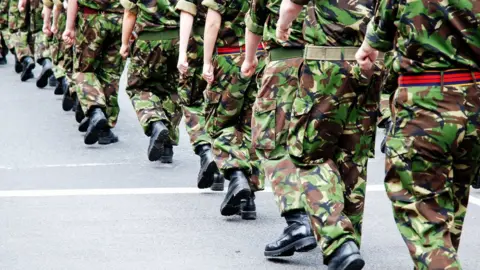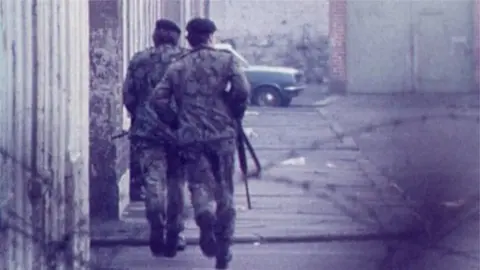New office to improve support for military veterans
 Getty Images
Getty ImagesA new Office for Veterans' Affairs is being created "to provide life-long support to military personnel".
Prime Minister Boris Johnson said it would "take responsibility for the full gamut of veterans' civilian lives".
That includes mental and physical health, education and employment.
It will also reportedly look at the legal pursuit of veterans, especially those who served in Northern Ireland - an issue which has caused significant anger within the Conservative Party.
Johnny Mercer MP - one of the most outspoken critics of the Historical Investigations Unit - has been appointed minister for defence people and veterans, and will jointly oversee the new office.
The MP for Plymouth - a veteran himself - will work alongside Oliver Dowden, a Cabinet Office minister with specific responsibility for veterans.
Their aim is to better co-ordinate the work of Whitehall departments, local authorities and charities to address veterans' needs.
Mel Waters, CEO of charity Help for Heroes, welcomed the announcement.
"Help for Heroes intends to work closely with the new Office of Veterans Affairs to ensure that it makes a positive and significant difference to the lives of veterans and their families, many of whom feel pretty let down by the current system," she said.
Sue Freeth, CEO of Combat Stress, said the creation of the office was "an excellent opportunity to provide a single voice at the cabinet table" for veterans, and she hoped to hold talks with Mr Mercer on the charity's proposals to improve mental health support.
'Unfair'
Speaking ahead of a visit to a military base in Scotland on Monday, the prime minister said it was "a stain on our national conscience that any veteran who has served should be abandoned by the country they have fought so courageously to protect".
He said the new office would ensure veterans get the medical treatment they require and training they need to re-enter civilian life, as well as aim to tackle "the scourge of veteran homelessness".
Mr Mercer said he was "determined to reset this country's relationship with her veterans".
He told the Sun the prime minister had "tasked me to end the repeated and vexatious pursuit of veterans" over offences allegedly committed in the line of duty.
In May, Mr Mercer withdrew his support for Theresa May and her government over the issue, and during his campaign for the Conservative leadership, Mr Johnson pledged to end "unfair" prosecutions of Army veterans who served in Northern Ireland "when no new evidence has been produced and when the accusations have already been exhaustively questioned in court".
Sinn Féin MP Francie Molloy said the creation of the new office would be "viewed by many campaigners and victims as a tactic for the British government to continue to obstruct efforts to address the legacy of the conflict and create another smokescreen to hide the role it played".
"It is further evidence that this British government's policy is aimed at giving current and former British soldiers immunity from prosecution."

What is the issue around historical prosecutions?

Six former soldiers who served in Northern Ireland during the Troubles are currently facing prosecution.
The cases relate to the killings of two people on Bloody Sunday in Londonderry in January 1972; as well as the deaths in separate incidents of Daniel Hegarty, John Pat Cunningham; Joe McCann and Aidan McAnespie.
Not all of the charges are for murder.
The Public Prosecution Service in Northern Ireland has said that of 26 so-called Troubles legacy cases it has taken decisions on since 2011, 13 related to republicans, eight to loyalists, and five are connected to the Army.
The idea of a statute of limitations for former soldiers is backed by many Tory backbenchers, but it was withdrawn from a legacy consultation document published in May 2018, even though Theresa May had claimed the system for investigating the past was "patently unfair".

Mr Mercer is one of a number of Tory MPs who have been extremely critical of the handling of the issue of historical prosecutions.
Former leader Iain Duncan Smith - who served in Northern Ireland during the Troubles - said "many old veterans" were finding that despite "having been cleared decades ago" they were being investigated again "with no new evidence".
"How can I say to my old colleagues that this government has not abandoned them?" he asked the then PM in May.
Mr Mercer said he had also been asked by Mr Johnson to put together legislation to place into law the Armed Forces covenant - a promise by the nation to treat serving personnel, veterans, and their families fairly.

Analysis: By Julian O'Neill, home affairs correspondent, BBC Northern Ireland
Some form of move to address veterans' issues was on the cards. Former Defence Secretary Penny Mordaunt signalled it in May, suggesting a new law limiting future prosecution of former soldiers.
It remains to be seen if this is what materialises - especially if it seeks to cover the Troubles.
Government proposals for dealing with the past in Northern Ireland have ruled out amnesties for anyone.
Any attempt to treat veterans differently would enrage nationalist parties and could upset attempts to restore the devolved Assembly at Stormont.
But for now, Mr Johnson will have succeeded in pacifying his backbenches and his DUP allies.

